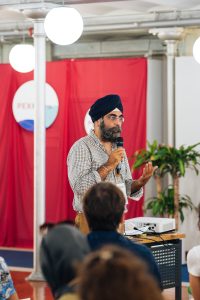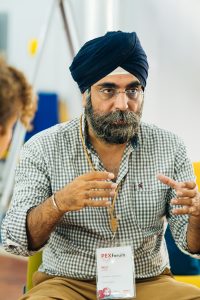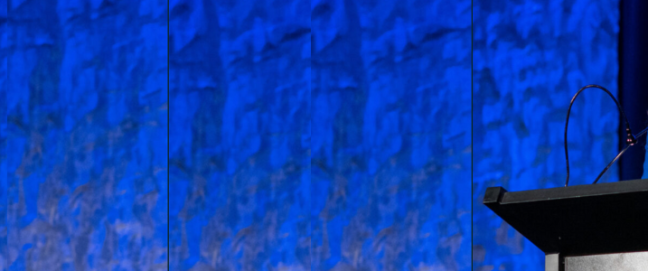It is the end of summer, and before students come back to Istanbul’s Kadir Has University, around 100 members of the PEX community gather for the second PEXforum to explore what it means to drive ecosystems change.
PEX’s first forum in 2020 in Madrid took place just weeks before the Covid-19 pandemic shut down global travel. Everyone is happy to be together again, but the conversations hold a more serious tenor this time, informed by the crisis we have just survived and wary of those that are coming.

Indy Johar deliveres a keynote speech at PEXforum 2022 in Istanbul, Turkey. Photo credit: PEX
Keynote speaker Indy Johar, the founder and Executive Director of Dark Matter Labs, puts these concerns front and centre in his talk: We are on the path to systems failure, he says, and the timescale is three to five years.
‘If your plan in your job that you have right now does not include dealing with this, then we have a problem’, Johar says.
He cites a number of grim statistics: 95 per cent of countries are precarious as a result of food crises and inflation; 68 per cent of S&P 500 companies would be non-viable if they had to price accurately; 1.2 billion people will be displaced by 2050.
Yet, despite all of this, Johar is hopeful. The possibility for transformation that lies ahead is extraordinary, he says.
I want to hear more, so Johar and I settle in for a longer conversation over cups of Turkish tea. And he tells me about his work, his organisation, and his hopes for the future.
A new, civic economy
Dark Matter Labs came out of Johar’s work as an architect, which for him, raised a lot of questions about what it means to build society.
‘What I was interested in was how do we democratically make society’, he reflects. At first, he looked at open-source housing projects, like WikiHouse, and set up two social investment structures – one was a social startup, the other took a systems view on housing. But quickly, Johar realised that he was tackling a symptom, not a cause.
‘Dark Matter was a reaction to recognising that whilst you could build some of these capabilities,’ like housing, he says, ‘there were more fundamental problems at the backend of it.
‘And more fundamental challenges at the level of: do we own nature? Do you own a piece of soil? Do own a tree? All the way through to our theories of monetary production, capital production, concentration of wealth. So, if we want to democratise how we make our places, we’re going to have to reimagine it,’ Johar says.
So, in 2015, Johar set up Dark Matter Labs to attempt to answer these questions. What began as a handful of people in London is now a worldwide team trying to ask the right questions about how a new, civic economy can ameliorate the consequences of outdated institutions and inadequate infrastructure.
‘Underneath the world that we have, there is an implicit order,’ Johar says. ‘There’s an implied order of the world we see around us, but it’s formed of another, our social imaginaries – and unless you recode, those social imaginaries, the world around us looks the same.
‘The world around us is now a zombie world because the fundamentals have actually transformed. And unless we recognise that and recode our social imaginaries, I don’t think can we see the next world.’
A world asleep
I ask Johar what he means when he says we are living in a zombie world. Our world is not so much the walking dead as it is asleep, is how I understand it. It has changed underneath us, and we haven’t yet awoken to that.
‘Over the last 400 years, the world has been constructed on a theory of objecthood, individuality and residual theories of control,’ he says. ‘And so, we’ve constructed the world view off the back of that.
‘The challenge that we face is that worldview no longer works in a complex, entangled, small world. So, where feedbacks are real and externalities cannot be ignored anymore, I think we’re in a major transformation in that sense.
Philanthropy is still trapped in what I would call system response. Like where something bad happens and philanthropy responds to it, which means that most of its resources are allocated to responding to symptoms rather, than structural allocations.
‘Now that means that this requires us reimagining ourselves. The reality is that biologically we’re all a spectrum. There’s not one you. There’s a spectrum of you. Your intelligence is not your intelligence, it’s a biological intelligence and it’s a function of your relationships. Your decision-making powers is as much of your gut intelligence – literally, your micro biomes in your gut – as it is other things. Your epigenetics, your contacts…’ Johar says, trailing off.
‘When you start to realise the depth of entanglement of our own selves – selves in plural – I think we start to have a new relationship with the world. And I think this is a cultural revolution and transformation. We have to break out of the Newtonian enlightenment idea of individualism into new theory of entanglement and coexistence and co-treaty with the world, which I think is fundamentally different and it transforms ideas of ownership, it transforms all these things that we take for granted in that model.’

Attendees of PEXforum break into small groups and discuss themes from Johar’s talk. Photo credit: PEX
The lost art of being strategic
I wonder aloud to Johar what he hopes the philanthropy professionals attending PEX will take away from his talk. Dark Matter Labs, which does receive some project and core philanthropic funding, for the most part turns its lens away from the inner workings of the philanthropy sector.
‘I think philanthropy is starting to get to grips with the complexity problem,’ he reflects.
‘I think philanthropy is starting to get to grips of a new kind of relationship with our nature-based assets. I think philanthropy has started to recognise, sort of, systemic intersectionality of and integral viewpoints that are necessary in our transition. Conceptually, philanthropy is doing a good job I would argue.
‘I think the challenge is, are we embracing the scale of what’s coming? Are we understanding the deep code transitions that are required for that? And I think one of the big risks is that while it’s conceptually doing a lot of the good work, philanthropy is still trapped in what I would call system response. Like where something bad happens and philanthropy responds to it, which means that most of its resources are allocated to responding to symptoms rather, than structural allocations.
‘I think it’s lost the art of being strategic.’
On collective organising and a space for philanthropy
It has been a summer of strikes in the UK, where Johar and I both live. Rising inflation and a cost-of-living crisis have led rail workers, bus drivers, air transport, lorry drivers, barristers, the postal service, nurses, the telecommunications sector, teachers, and refuse workers all to explore union action – if not strike outright. The public as well is striking in its own right: nearly 250,000 people have signed the Don’t Pay UK pledge, committing to cancelling their energy bills direct debit, striking against the riding cost of energy.

Indy Johar at PEXforum. Photo credit: PEX
Dark Matter Labs works on collective organising, so I ask Johar – in his expert opinion – how can philanthropy support this type of organising?
‘I think there’s a very powerful space for philanthropy to support consumer unions,’ Johar says. ‘The UK is a consumer economy. Sixty-eight per cent of its GDP comes from consumption. If we want to shift power, it is not through the labour lens. I think it must also be through the consumer lens, and we need to create a new class of legislative power through the consumer. And because much of our economic production is increasingly monopolised, it’s a great way of dealing with that monopoly framework.
‘I would argue that foundations should be actually building the legal infrastructure and advocating for the legal infrastructure for consumer unions.’
Would that look like supporting Don’t Pay UK or something similar, I ask?
‘I think it’d be more than that,’ Johar says. ‘I think we’re also creating the legal infrastructure, like labour unions have the right at a certain vote to be able to withhold labour. I think it would be the right for consumers and a certain right to be able to withhold payment for services.’
‘We need philanthropy to be smart’
Our conversation moves onto models of philanthropy. I ask a leading question: given the source of philanthropy’s wealth in extractive systems, can it ever be truly radical? Johar’s answer surprises me and offers a perspective to a debate on models of philanthropy that Alliance itself spent some time and space exploring earlier this year.
‘I think the reality is we’re about to go to hell in a handcart. So, what is philanthropy’s money and power worth if that reality comes to be?’ he says.
‘Philanthropy has a role to play. What I’m actually more and more nervous of is that I think there’s a danger of philanthropy glorifying its lack of strategic thinking. It is almost being forced into the position where, you know, the classic line is “hey, don’t you worry about the thinking, give us the money and we’ll figure it out.” I think that’s problematic.
‘Actually, we need philanthropy to be smart, and I want philanthropy to be smart, and also trusting and recognising of the smarts of others. So, it’s not that I want philanthropy to be stupid, I want it to be smart, in dialogue with partners that are also smart, and to be trusting in that framework side.
‘I think when you reduce the capabilities of philanthropy, you also change the capabilities to be able to respond beyond symptoms. Philanthropy gets trapped into a reactive response cycle of what is most obvious. I think that undermines its capacity for change.
‘I think that’s what’s undermining it. You know, if you want to destroy the capability of philanthropy, you just look at overhead costs, and you say: well, reduce your overhead cost to nothing. I think that’s fundamentally impairing a critical tool right now to driving change, because governments are captured and private capital is locked in. If we can’t unlock that capital properly, I think we’re in trouble. I think you’re right about everything you say about the inherent nature of the source of capital, but if you’re looking from a tactical strategies perspective, I think philanthropy has to embrace this problem.’
‘Don’t be afraid of yourself,’ he says, later on in our conversation, when I ask him about his message to the PEX community. ‘I think we made philanthropy afraid of itself. We need it to be bigger. In a humble way, but bigger.’
Three to five years
Johar’s statement about the immediacy of the timescale for the climate crisis has been on my mind throughout our conversation. I ask him to elaborate.
The timescale, the work ahead of us, ‘is not about saying, “hey, let’s empower our kids,”’ he says.
This is the one in a 400-year crisis, because it’s about reimagining ourselves
‘The reality is we are probably all in the roles – or one role away from the roles – that we’re going to have to be able to make the change. I think it’s really critical that we start to manifest these challenges through the roles that we have.
‘And my point later on, just as we closed, was that this [work] can happen in every position: whether it’s an employment contract, whether you’re writing a grant contract, whether you’re writing an op-ed and a frame, what language you’re using, whether you are actually allocating to systems change in different ways and different tools of allocation.
‘My big point is that I think change is possible in every frame right now, and it’s in our roles – or one role more – in the next three years.’
‘There’s something extraordinary afoot’

A view of the sea out a window at Kadir Has University in Istanbul. Photo credit: PEX
In both his talk at PEXforum, and our conversation afterwards, Johar stresses the importance of reconciling how we understand the cycles that society operates on. Because of political systems, we’re used to thinking in two or four or six year cycles. But right now, we’re in the middle of a 400-year cycle.
‘This is the one in a 400-year crisis, because it’s about reimagining ourselves,’ Johar says.
I see him in Manchester at the UK Community Foundations conference a few weeks after this conversation and he expands: ‘we’re in Marshall Plan territory’, he says, referencing America’s post-WWII initative to provide billions in aid to Western Europe to help it recover.
This is all heavy and big, I say – the scale of what’s needed and the suffering that we will endure as we make our way there. What gives you hope?.
‘If you look at the long arc of our civilization, I think we may be entering an extraordinary age where, for the first time, maybe the planet is becoming self-conscious, where machine-human ecological systems are entangling in a point that actually the planet is able to sense itself overheating and try to actually correct itself,’ Johar says.
‘I think there might be a new organism being born in the universe, and I think we’re in the growing pains of that transition into a completely different idea and I think we’re inside it, so we can’t see it, but there’s something extraordinary afoot. And I think embracing that extraordinariness is critical.’
Elika Roohi is Digital Editor at Alliance magazine.






Comments (0)